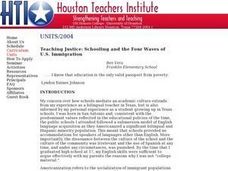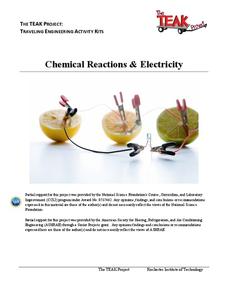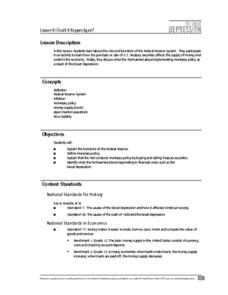Constitutional Rights Foundation
Refugees from the Caribbean: Cuban and Haitian “Boat People”
Should refugees fleeing poverty be allowed the same entrance into the United States as those fleeing persecution? High schoolers read about US foreign policy in the late 20th century regarding refugees from Cuba and Haiti, and engage in...
Constitutional Rights Foundation
Special Order 40
The city of Los Angeles' 1979 Special Order 40 states: "LAPD officers shall not initiate police action with the objective of discovering the alien status of a person." After reading a fact sheet that details the history of Special Order...
Curated OER
Mapping the Mediasphere
Students compare/contrast the media messages they see in two different communities in their city. They list the elements of art and the principles of design in the photographs they have taken in those two different communities. They...
Curated OER
Teaching Justice: Schooling and the Four Waves of U.S. Immigration
U.S. immigration is the focus of a unit on social justice. Over the course of a school year, young historians read a variety of texts to learn about four waves of immigration that have occurred over time in the U.S. An emphasis on...
Constitutional Rights Foundation
Plyler v. Doe: Can States Deny Public Benefits to Illegal Immigrants?
Illegal immigration is an ever-changing source of consistent controversy. A reading passage about the rights of undocumented workers and illegal immigrants—and the lack thereof—guides high schoolers into a mock trial activity. Three...
Curated OER
Comedy Across the Curriculum
The New York Times Learning Network provides the resources that permit pupils to examine and then write and perform a fake news broadcast in the vein of “The Daily Show” or “Saturday Night Live” Weekend Update. The generated reports...
Rochester Institute of Technology
Heat Transfer
Use an exciting role play activity to teach young chemists about the importance of heat transfer in maintaining homeostasis. They assume the role of a dog sled owner who has been abandoned and must fend for themselves with only a...
Rochester Institute of Technology
Solar Energy
Warm up to the idea of solar energy. A lesson includes three activities that challenge scholars to apply knowledge in new ways. First, they learn to run an alarm clock without a battery by using solar energy. Next, they complete an...
Rochester Institute of Technology
Molecules and Fuel Cell Technology
A fuel cell is where the jailer keeps gas guzzlers. Scholars review chemical reactions, chemical bonds, and chemical structure in order to apply these concepts. Participants construct fuel cell kits, using electrolysis to run the car and...
Rochester Institute of Technology
Chemical Reactions and Electricity
After a discussion of chemical reactions and electricity, scholars break into groups and follow a scripted activity to discover if fruit can power a clock. After a concluding discussion, the class a presented with a challenge.
Humanities Texas
Primary Source Worksheet: John T. McCutcheon, “A Wise Economist Asks a Question”
No joke! Kids learn how to read political cartoons using McCutcheon's drawing as a starting point and then progressing to other images found online.
Federal Reserve Bank
Could It Happen Again?
The final instructional activity in a series of six about the Great Depression focuses on the Federal Reserve's role in stabilizing the economy.
Curated OER
Cultural and Social Transformations Since 1865
Students research cultural and social issues in the areas of Westward Expansion, Immigration, and Civil Rights. They use their research to create a PowerPoint electronic book to be used by other students.
Curated OER
Japaneses Internment: Lesson 1 of 4: Chronological Events Leading to Internment
Students examine facts about history of the Asians experience in America and identify patterns of Asian immigration in the United States. Students develop reasons specific Asian ethnic groups migrated to the United States and predict...
Curated OER
Bi-Lateral Systems of Government
Students discover how Aboriginal forms of Government can be adapted and how the Navajo's have utilized government.
Curated OER
Revolutionary Women Portraits: Finding and Viewing New Perspectives
Young scholars identify and analyze portraits of Revolutionary-era women. Creating a concept web, they record the actions by women during the war to be made into a chart and timeline. They discuss the cultural and social expectations of...
Other popular searches
- American Society and Values
- Schools in American Society
- Vietnam and American Society
- Native American Society
- In the American Society
- North American Society
- Cultures in American Society















